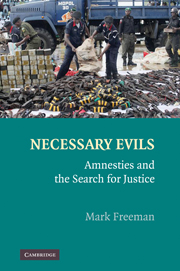Book contents
- Frontmatter
- Contents
- Preface
- Acknowledgments
- Abbreviations and Legal Terms
- Opening Considerations: On the Perennial Relevance of Amnesties
- Part I The Debate on Amnesties
- Part II The Design of Amnesties
- Final Considerations: On the Perennial Contestation of Amnesties
- Appendix 1 Summary Guidelines for Effective Amnesty Design
- Appendix 2 Selected Excerpts from International Legal Instruments
- Appendix 3 Selected Excerpts from Jurisprudence on Amnesties
- Notes
- Index
- References
Appendix 3 - Selected Excerpts from Jurisprudence on Amnesties
Published online by Cambridge University Press: 04 May 2010
- Frontmatter
- Contents
- Preface
- Acknowledgments
- Abbreviations and Legal Terms
- Opening Considerations: On the Perennial Relevance of Amnesties
- Part I The Debate on Amnesties
- Part II The Design of Amnesties
- Final Considerations: On the Perennial Contestation of Amnesties
- Appendix 1 Summary Guidelines for Effective Amnesty Design
- Appendix 2 Selected Excerpts from International Legal Instruments
- Appendix 3 Selected Excerpts from Jurisprudence on Amnesties
- Notes
- Index
- References
Summary
Case of Almonacid-Arellano et al. v. Chile, Inter-American Court of Human Rights, Judgment of September 26, 2006 (Preliminary Objections, Merits, Reparations and Costs), paras. 105–29.
Prosecutor v. Allieu Kondewa (Decision on Lack of Jurisdiction/Abuses of Process: Amnesty Provided by the Lome Accord), Special Court for Sierra Leone, Appeals Chamber, Case No. SCSL-2004–14-AR72(E), May 25, 2004, paras. 30–57 (Separate Opinion of Justice Robertson).
Azanian Peoples Organization (AZAPO) and Others v. President of the Republic of South Africa and Others, Constitutional Court of South Africa, Case No. CCT17/96 (July 25, 1996), Judgment of Mahomed DP.
1. Case of Almonacid-Arellano et al. v. Chile, Inter-American Court of Human Rights, Judgment of September 26, 2006 (Preliminary Objections, Merits, Reparations and Costs), paras. 105–129
b) Impossibility to grant an amnesty for crimes against humanity
105. According to the International Law corpus iuris, a crime against humanity is in itself a serious violation of human rights and affects mankind as a whole. In the Case of Prosecutor v. Erdemovic, the International Tribunal for the Former Yugoslavia stated that:
Crimes against humanity are serious acts of violence which harm human beings by striking what is most essential to them: their life, liberty, physical welfare, health, and or dignity. They are inhumane acts that by their extent and gravity go beyond the limits tolerable to the international community, which must perforce demand their punishment. But crimes against humanity also transcend the individual because when the individual is assaulted, humanity comes under attack and is negated. It is therefore the concept of humanity as victim which essentially characterises crimes against humanity.
- Type
- Chapter
- Information
- Necessary EvilsAmnesties and the Search for Justice, pp. 196 - 248Publisher: Cambridge University PressPrint publication year: 2009



